302 scholarly books by University College London and 12
start with W
302 scholarly books by University College London and 12
302 scholarly books by University College London
12 start with W start with W
12 start with W start with W

Waiting For The Revolution To End
Syrian Displacement, Time and Subjectivity
Charlotte Al-Khalili
University College London, 2023
An exploration of the Syrian revolution through the experiences of citizens in exile.
Based on more than three years of embedded fieldwork with Syrians displaced in the border city of Gaziantep (southern Turkey), this book places the Syrian revolution and its tragic aftermath under ethnographic scrutiny. It charts the evolution from peaceful uprising (2011) to armed confrontation (2012), descent into fully fledged conflict (2013) and finally to proxy war (2015), to propose an understanding of revolution beyond success and failure.
While the Assad regime remains in place, the Syrian revolution (al-thawra) still holds a transformational power that can be located on intimate and world-making scales. Charlotte Al-Khalili traces the unintended consequences of revolution to reveal the reshaping of Syrian life-worlds and exiles’ evolving theorizations, experiences, and imaginations of al-thawra. She describes the in-between spatio-temporal realm inhabited by Syrians displaced to Turkey as they await the revolution’s outcomes and maps the revolution’s multidimensional and multi-scalar effects on their everyday life. By following the chronology of events inside Syria and Syrians’ geography of displacement, Waiting for the Revolution to End makes the relation between revolution and displacement its centerpiece, both as an ethnographic object and an analytical device.
Based on more than three years of embedded fieldwork with Syrians displaced in the border city of Gaziantep (southern Turkey), this book places the Syrian revolution and its tragic aftermath under ethnographic scrutiny. It charts the evolution from peaceful uprising (2011) to armed confrontation (2012), descent into fully fledged conflict (2013) and finally to proxy war (2015), to propose an understanding of revolution beyond success and failure.
While the Assad regime remains in place, the Syrian revolution (al-thawra) still holds a transformational power that can be located on intimate and world-making scales. Charlotte Al-Khalili traces the unintended consequences of revolution to reveal the reshaping of Syrian life-worlds and exiles’ evolving theorizations, experiences, and imaginations of al-thawra. She describes the in-between spatio-temporal realm inhabited by Syrians displaced to Turkey as they await the revolution’s outcomes and maps the revolution’s multidimensional and multi-scalar effects on their everyday life. By following the chronology of events inside Syria and Syrians’ geography of displacement, Waiting for the Revolution to End makes the relation between revolution and displacement its centerpiece, both as an ethnographic object and an analytical device.
[more]

Wastiary
A Bestiary of Waste
Edited by Michael Picard, Albert Brenchat-Aguilar, Timothy Carroll, Jane Gilbert, and Nicola Miller
University College London, 2023
A heterodox compendium of “beasts of waste,” playfully re-imagining the medieval treatise on various kinds of animals.
Wastiary: A Bestiary of Waste is a creative exercise that occupies letters, numbers, and symbols of Western academic language to compose a list of thirty-five short entries on the uncomfortable but pressing topic of waste in the contemporary world. The collection is richly illustrated with artwork, photography, collage, and mixed media and conveys the message that various forms of waste and pollution have achieved a beast-like or untamable quality, at times pungently transferring to considerations of “the human,” or humans treated as waste.
Wastiary: A Bestiary of Waste is a creative exercise that occupies letters, numbers, and symbols of Western academic language to compose a list of thirty-five short entries on the uncomfortable but pressing topic of waste in the contemporary world. The collection is richly illustrated with artwork, photography, collage, and mixed media and conveys the message that various forms of waste and pollution have achieved a beast-like or untamable quality, at times pungently transferring to considerations of “the human,” or humans treated as waste.
[more]
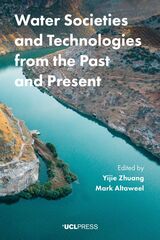
Water Societies and Technologies from the Past and Present
Edited by Mark Altaweel and Yijie Zhuang
University College London, 2018
Today, our societies face great challenges with water, both in terms of quantity and quality, but many of these challenges also existed at points in the past. Focusing on Asia, Water Societies and Technologies from the Past and Present seeks to highlight the issues that emerge or reemerge across different societies and periods and asks what they can tell us about water sustainability. Incorporating cutting-edge research and pioneering field surveys on past and present water management practices, the interdisciplinary contributors together identify how societies managed water resource challenges and utilized water in ways that allowed them to evolve, persist, or drastically alter their environment.
[more]
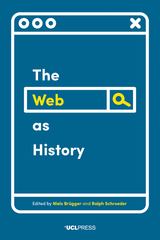
Web as History
Using Web Archives to Understand the Past and the Present
Edited by Niels Brügger and Ralph Schroeder
University College London, 2017
The World Wide Web has now been in use for more than 20 years. From early browsers to today’s principal source of information, entertainment and much else, the Web is an integral part of our daily lives, to the extent that some people believe ‘if it’s not online, it doesn’t exist.’ While this statement is not entirely true, it is becoming increasingly accurate, and reflects the Web’s role as an indispensable treasure trove. It is curious, therefore, that historians and social scientists have thus far made little use of the Web to investigate historical patterns of culture and society, despite making good use of letters, novels, newspapers, radio and television programmes, and other pre-digital artefacts. This volume argues that now is the time to question what we have learnt from the Web so far. The 12 chapters explore this topic from a number of interdisciplinary angles – through histories of national web spaces and case studies of different government and media domains – as well as an introduction that provides an overview of this exciting new area of research.
[more]
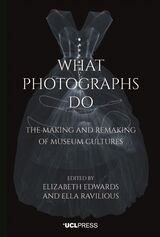
What Photographs Do
The Making and Remaking of Museum Cultures
Edited by Elizabeth Edwards and Ella Ravilious
University College London, 2022
A collective case study of photographic culture through the lens of the Victoria and Albert Museum.
A massive quantity of museums’ photographic holdings resides not on gallery walls or archives, but outside of their formal collections, including reference photos and ephemera that are integral to the workings of museums. What Photographs Do explores how museums are defined through their photographic practices. Studied through the prism of the Victoria and Albert Museum in London, this collection asks complex and ambiguous questions about how accumulations of photographs create the values, hierarchies, histories, and knowledge systems of a museum ecosystem. Chapters are comprised of short, auto-ethnographic interventions from museum practitioners, from studio photographers and image managers to conservators and non-photographic curators, who address the significance of both historical and contemporary practices of photography in their work, providing an extensive and unique range of accounts of what photographs do in museums while also expanding the critical discourse of both photography and museums.
A massive quantity of museums’ photographic holdings resides not on gallery walls or archives, but outside of their formal collections, including reference photos and ephemera that are integral to the workings of museums. What Photographs Do explores how museums are defined through their photographic practices. Studied through the prism of the Victoria and Albert Museum in London, this collection asks complex and ambiguous questions about how accumulations of photographs create the values, hierarchies, histories, and knowledge systems of a museum ecosystem. Chapters are comprised of short, auto-ethnographic interventions from museum practitioners, from studio photographers and image managers to conservators and non-photographic curators, who address the significance of both historical and contemporary practices of photography in their work, providing an extensive and unique range of accounts of what photographs do in museums while also expanding the critical discourse of both photography and museums.
[more]
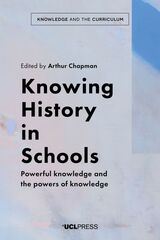
What Should Schools Teach?
Disciplines, Subjects and the Pursuit of Truth
Edited by Alka Sehgal Cuthbert and Alex Standish
University College London, 2021
A robust rationale on what schools should teach and how.
The design of school curricula involves deep thought about the nature of knowledge and its value to learners and society. Such a serious responsibility raises a number of questions: What is knowledge for? What knowledge is important for children to learn? How do we decide what knowledge matters in each school subject? The blurring of distinctions between pedagogy and curriculum, as well as that between experience and knowledge, has resulted in a confusing message for teachers about the part that each plays in the education of children. This book aims to dispel confusion through a robust rationale for what schools should teach, offering key understanding to teachers of the relationship between knowledge and their own pedagogy. This second edition includes new chapters on chemistry, drama, music, and religious education, as well as an updated chapter on biology. A revised introduction reflects on the emerging discourse around decolonizing the curriculum and on the relationship between the knowledge that children encounter at school and in their homes.
The design of school curricula involves deep thought about the nature of knowledge and its value to learners and society. Such a serious responsibility raises a number of questions: What is knowledge for? What knowledge is important for children to learn? How do we decide what knowledge matters in each school subject? The blurring of distinctions between pedagogy and curriculum, as well as that between experience and knowledge, has resulted in a confusing message for teachers about the part that each plays in the education of children. This book aims to dispel confusion through a robust rationale for what schools should teach, offering key understanding to teachers of the relationship between knowledge and their own pedagogy. This second edition includes new chapters on chemistry, drama, music, and religious education, as well as an updated chapter on biology. A revised introduction reflects on the emerging discourse around decolonizing the curriculum and on the relationship between the knowledge that children encounter at school and in their homes.
[more]
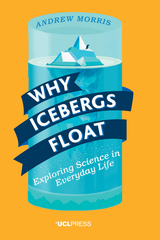
Why Icebergs Float
Exploring Science in Everyday Life
Andrew Morris
University College London, 2016
From paintings and food to illness and icebergs, science is happening everywhere. Rather than follow the path of a syllabus or textbook, Andrew Morris takes examples from the science we see every day and uses them as entry points to explain a number of fundamental scientific concepts – from understanding colour to the nature of hormones – in ways that anyone can grasp. While each chapter offers a separate story, they are linked together by their fascinating relevance to our daily lives. The topics explored in each chapter are based on hundreds of discussions the author has led with adult science learners over many years – people who came from all walks of life and had no scientific training, but had developed a burning curiosity to understand the world around them. This book encourages us to reflect on our own relationship with science and serves as an important reminder of why we should continue learning as adults.
[more]
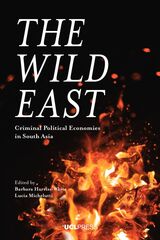
The Wild East
Criminal Political Economies in South Asia
Edited by Barbara Harriss-White and Lucia Michelutti
University College London, 2019
Through eleven case studies conducted across India, Pakistan, and Bangladesh, The Wild East examines a variety of economic sectors and business enterprises that regularly flout the law, such as coal, oil, real estate, and industrial labor. Bridging anthropology and political economy, the case studies explore how state regulative law is ignored or selectively manipulated and reveal the workings of regulated criminal economic systems in which politicians, police, judges, and bureaucrats are closely intertwined. Disrupting the existing literature on South Asia’s informal economy, The Wild East also suggests avenues for future research that will be of critical value to students and scholars of economics, anthropology, sociology, criminology, comparative politics, political science, and international relations.
[more]
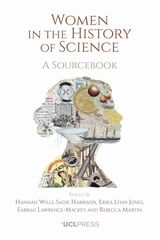
Women in the History of Science
A Sourcebook
Edited by Hannah Wills, Sadie Harrison, Erika Lynn Jones, Rebecca Martin, Farrah Lawrence-Mackey
University College London, 2023
A rich collection of primary sources on women in the history of science.
Women in the History of Science brings together primary sources that highlight women’s involvement in scientific knowledge production around the world. Including texts, images, and objects, the primary sources are each accompanied by an explanatory text, questions to prompt discussion, and a bibliography to aid further research. Arranged by time period, from 1200 BCE to the twenty-first century, and covering twelve inclusive and far-reaching themes, this book is an invaluable companion to students and lecturers alike in exploring women’s history in the fields of science, technology, mathematics, medicine, and culture.
Women in the History of Science brings together primary sources that highlight women’s involvement in scientific knowledge production around the world. Including texts, images, and objects, the primary sources are each accompanied by an explanatory text, questions to prompt discussion, and a bibliography to aid further research. Arranged by time period, from 1200 BCE to the twenty-first century, and covering twelve inclusive and far-reaching themes, this book is an invaluable companion to students and lecturers alike in exploring women’s history in the fields of science, technology, mathematics, medicine, and culture.
[more]

The World Wide Web of Work
A History in the Making
Marcel van der Linden
University College London, 2023
A groundbreaking exploration of the core ideas and concepts of global labor history.
Global labor history is one of the fastest-growing fields of study worldwide today. This volume assembles a group of contributors from around the world to discuss the core concepts “capitalism” and “workers,” and to refine notions such as “coerced labor,” “household strategies,” and “labor markets.” It explores in new ways the connections between laborers in different parts of the world, arguing that both globalization and modern labor management originated in agriculture in the Global South and were only later introduced in Northern industrial settings. It reveals that nineteenth-century chattel slavery was frequently replaced by other forms of coerced labor, and it reconstructs the twentieth-century attempts of the International Labor Organisation to regulate work standards internationally. The book also pays attention to the relational inequality through which workers in wealthy countries benefit from the exploitation of those in poor countries. The final part addresses workers’ resistance and acquiescence: why collective actions often have unanticipated consequences, why and how workers sometimes organize massive flights from exploitation and oppression, and why proletarian revolutions took place in pre-industrial or industrializing countries but never in fully developed capitalist societies.
Global labor history is one of the fastest-growing fields of study worldwide today. This volume assembles a group of contributors from around the world to discuss the core concepts “capitalism” and “workers,” and to refine notions such as “coerced labor,” “household strategies,” and “labor markets.” It explores in new ways the connections between laborers in different parts of the world, arguing that both globalization and modern labor management originated in agriculture in the Global South and were only later introduced in Northern industrial settings. It reveals that nineteenth-century chattel slavery was frequently replaced by other forms of coerced labor, and it reconstructs the twentieth-century attempts of the International Labor Organisation to regulate work standards internationally. The book also pays attention to the relational inequality through which workers in wealthy countries benefit from the exploitation of those in poor countries. The final part addresses workers’ resistance and acquiescence: why collective actions often have unanticipated consequences, why and how workers sometimes organize massive flights from exploitation and oppression, and why proletarian revolutions took place in pre-industrial or industrializing countries but never in fully developed capitalist societies.
[more]
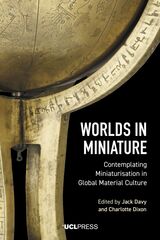
Worlds in Miniature
Contemplating Miniaturisation in Global Material Culture
Edited by Jack Davy and Charlotte Dixon
University College London, 2019
Miniaturization is the creation of small objects that resemble larger ones, usually but not always for purposes different to those of the larger original object. Worlds in Miniature brings together researchers working across various regions, time periods and disciplines to explore the subject of miniaturization as a material culture technique. It offers original contributions to the field of miniaturization through its broad geographical scope, interdisciplinary approach, and deep understanding of miniatures and their diverse contexts.
Beginning with an introduction by the editors, which offers a guide to studying and comparing miniatures, the following chapters include studies of miniature Neolithic stone circles on Exmoor, Ancient Egyptian miniature assemblages, miniaturization under colonialism as practiced by the Makah People of Washington State, miniature watercraft from India, miniaturized contemporary tourist art of the Warao people of Venezuela, and dioramas on display in the Science Museum. Interspersing the chapters are interviews with miniature-makers, including two miniature boat builders at the National Maritime Museum, Cornwall and a freelance architectural model maker. The interdisciplinary nature of the volume makes it suitable reading for anthropologists, historians, archaeologists, artists, and researchers in related fields across the social sciences.
Beginning with an introduction by the editors, which offers a guide to studying and comparing miniatures, the following chapters include studies of miniature Neolithic stone circles on Exmoor, Ancient Egyptian miniature assemblages, miniaturization under colonialism as practiced by the Makah People of Washington State, miniature watercraft from India, miniaturized contemporary tourist art of the Warao people of Venezuela, and dioramas on display in the Science Museum. Interspersing the chapters are interviews with miniature-makers, including two miniature boat builders at the National Maritime Museum, Cornwall and a freelance architectural model maker. The interdisciplinary nature of the volume makes it suitable reading for anthropologists, historians, archaeologists, artists, and researchers in related fields across the social sciences.
[more]
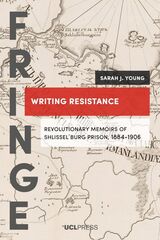
Writing Resistance
Revolutionary Memoirs of Shlissel´burg Prison, 1884-1906
Sarah J. Young
University College London, 2021
The first extended study in English of the revolutionary memoirs from Shlissel’burg Fortress.
In 1884, sixty-eight prisoners convicted of terrorism and revolutionary activity were transferred to a new maximum-security prison at Shlissel´burg Fortress near St. Petersburg. Inhuman conditions in the prison caused severe mental and physical deterioration among the prisoners, and over half died. However, the survivors fought back to reform the prison and improve the inmates’ living conditions. Their memoirs enshrined their experience in revolutionary mythology and served as an indictment of the Tsarist autocracy’s loss of moral authority. This book features three of these memoirs—translated into English for the first time—as well as an introductory essay that analyzes the memoirs’ construction of a collective narrative of resilience, resistance, and renewal. The first extended study of these memoirs in English, this book uncovers an important episode in the history of political imprisonment. It will be of interest to scholars and students of the Russian revolution, carceral history, penal practice and behaviors, and prison and life writing.
In 1884, sixty-eight prisoners convicted of terrorism and revolutionary activity were transferred to a new maximum-security prison at Shlissel´burg Fortress near St. Petersburg. Inhuman conditions in the prison caused severe mental and physical deterioration among the prisoners, and over half died. However, the survivors fought back to reform the prison and improve the inmates’ living conditions. Their memoirs enshrined their experience in revolutionary mythology and served as an indictment of the Tsarist autocracy’s loss of moral authority. This book features three of these memoirs—translated into English for the first time—as well as an introductory essay that analyzes the memoirs’ construction of a collective narrative of resilience, resistance, and renewal. The first extended study of these memoirs in English, this book uncovers an important episode in the history of political imprisonment. It will be of interest to scholars and students of the Russian revolution, carceral history, penal practice and behaviors, and prison and life writing.
[more]
READERS
Browse our collection.
PUBLISHERS
See BiblioVault's publisher services.
STUDENT SERVICES
Files for college accessibility offices.
UChicago Accessibility Resources
home | accessibility | search | about | contact us
BiblioVault ® 2001 - 2024
The University of Chicago Press









